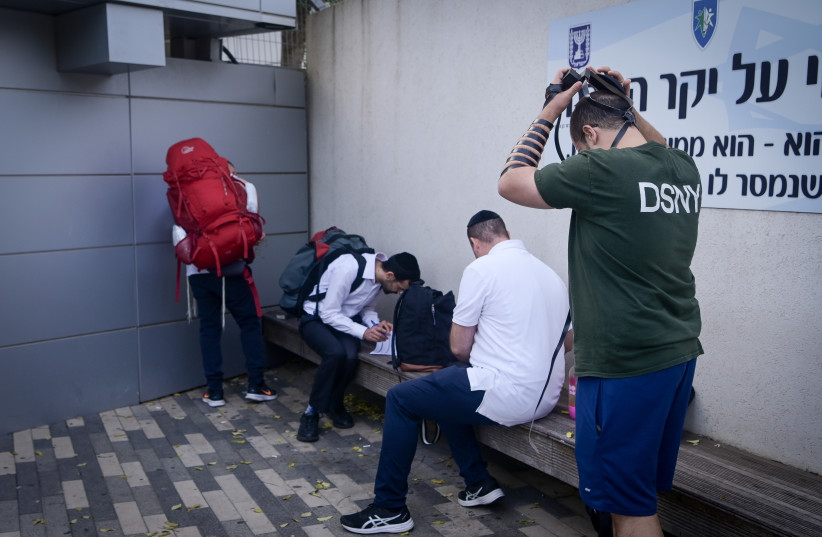The debate surrounding the haredi community’s contributions to society is nothing new in Israel. Yet the current war presents an opportunity to put many such concerns to rest.
About 3,000 haredim have applied to enlist in the IDF voluntarily since the war broke out, and approximately 450 haredim over age 26 have enlisted as reservists, not to mention the harrowing work being done by haredim working with United Hatzalah and ZAKA.
And yet, Shuki Friedman, vice president of the Jewish People Policy Institute (JPPI), argues in these pages that “only an externally imposed change that curtails state support for the haredi way of life… would propel their socioeconomic integration and save Israel from a third-world future.”
Friedman’s assertion is based on data produced by his organization’s research. But the real story goes beyond the numbers in his surveys.
Haredim succeed, given the opportunity
Haredim have long been berated for their low rates of employment and IDF enlistment. However, when presented with opportunities, haredim have risen to the occasion and demonstrated that they are not only capable but eager to participate in many aspects of Israeli society and the workforce – as long as their core values and religious life are not threatened. At the Jerusalem College of Technology (JCT), I see this reality play out on a daily basis.

Earlier this year, we unveiled a new preparatory program for haredi pre-medical students. We received over 300 applications and selected the top 10% for admission. The selection process was difficult since almost every candidate was qualified. These students are now studying an intensive pre-med core of courses and will stand for the regular medical school admission process within the next few months.
Similarly, a few years ago, we pioneered a revolutionary approach to cybersecurity training (a program we called Cyber Elite). We enabled computer science and software engineering graduates to spend 3 days a week working for a cybersecurity company and 2 days a week taking a high-level cybersecurity training course developed in partnership with graduates of IDF intelligence units. The result was amazing. JCT has almost 50% haredi men and women among our nearly 5,000 students. The 31 students in that first Cyber Elite group were a similar mix of haredi and non-haredi men and women. At the end of the course, all 31 students joined the many hundreds of participants in the Cyber week competition at Tel Aviv University. When the 90 finalists were chosen, they included 18 of our students. Moreover, three of our haredi women were the only women among the finalists.
The common denominator of these two initiatives is that both Health Care and Hi-Tech are areas in which haredim are badly under-represented, certainly in the high end positions in those fields. After all, considering the poor K-12 education among haredim, it has been assumed that they cannot successfully catch up; not true. It is telling that JCT’s effort to level the playing field and give haredi applicants a legitimate chance to succeed in the highest echelons of these disciplines is working and those choosing these paths are not being scorned by their community. It’s a work in progress, but “the train has left the station.”
Importantly, the examples cited above are not reactions to the unprecedented barbarity that Israelis experienced on October 7, as JPPI’s Friedman suggests. Did the sense of national unity during the war strengthen these trends? Perhaps. But, rather than dismissing these changes as short-lived, this is an opportunity to build on the current momentum and to reverse age-old toxic behaviors.
Much of the dialogue between haredim and secular society is driven by fear. Haredim are fearful that secular society wants them to fully assimilate and abandon their identity, and secular Israelis fear that haredim will displace the values and conduct of secular society.
Punishing haredi society does not encourage greater participation. Rather, haredim need a call to action that recognizes the shared stake we all have in creating a harmonious society. Much like JCT has presented haredim with an opportunity to strengthen their education and earn high-level degrees, Israel must find ways to incentivize haredim to integrate into daily life while also allowing them to preserve who they are.
This proposition should not sound foreign to secular ears. Secular Jews living in the United States, for example, surely do not want the government to dictate how Jewish they are allowed to be. Doing so contradicts democratic values. It is not up to the state to dictate its citizens’ lifestyle – but the state does have the responsibility to ensure that all citizens can live in dignity with mutual respect.
With haredim comprising roughly 13% of Israel’s population, with that figure expected to grow to 20% by 2033, Israelis cannot afford to shout at each other about this issue – which is what unfortunately is occurring in the current Knesset debates about the state budget. Instead, the government should meet haredim where they are and recognize that like most Israelis, they want to provide for their family and are largely not averse to being part, in a more insular way, of the greater fabric of society. The overarching caveat is that they do not want to be forced to choose between their faith and their wallet.
Now more than ever, secular and haredi Israelis have an opportunity to focus on their common concerns and aspirations rather than on their differences. Leveraging today’s unity in Israeli society will pave the way for a more harmonious future for us all and a stronger State of Israel.
The writer is president of the Jerusalem College of Technology.
